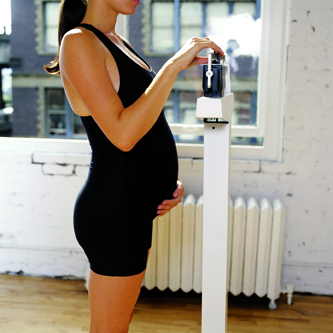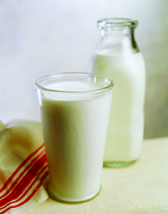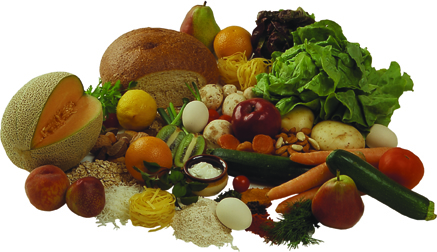Foods during pregnancy
A balanced diet and keeping the mother healthy during conception and throughout pregnancy are crucial for a baby's growth in the uterus. Here's a recommended diet for future mommy and baby.

+ During pregnancy women's bodies use up more energy, increasing the rate of metabolism, which makes a higher calorie intake necessary. A pregnant woman needs around 300 more calories a day than a normal diet. It's advised that you eat smaller meals, several times a day: five or six light meals a day that are rich in nutrients is better than one or two heavy meals a day.
TAKE ADVANTAGE OF FOOD VALUES
To optimize the absorption of nutrients:
- • Eat organic foods, avoid preservatives and additives.
- • Eat fresh and raw foods whenever possible. Steam foods instead of boiling and avoid fried foods.
- • Drink filtered water and wash all fruits and vegetables.
- • Avoid excess salt that can cause water retention, especially in the legs. For the same reason don't drink too much mineral water.
- • Many nutrients act in synergy with other nutrients, which is why it's recommended to take a multi-vitamin and mineral supplement rather than taking vitamins and minerals separately. Consult your doctor.
- • Eat a wide range of foods that include all essential nutrients.
ANTI-NUTRIENTS
These foods inhibit the absorption of nutrients causing a negative balance in the nutritional level. Some foods you should remove from your diet:
- • Do not drink alcohol. It can harm the baby and impedes the body from absorbing vitamin B, calcium, iron, zinc and magnesium. It also increases blood pressure.
- • Don't smoke. Cigarette smoke (first and second hand) can cause miscarriage, birth defects, premature birth and low birth weight. It also reduces the amount of oxygen and nutrients for the fetus. Nicotine increases the reduction of calcium and destroys vitamin C.
- • Avoid tea and coffee that tend to have a diuretic effect that can interfere with the absorption of calcium, magnesium, zinc and iron.
- • Don't take strong laxatives because they can weaken the fetus and the uterus.
ESSENTIAL NUTRIENTS AND THEIR SOURCES

- • Calcium. Low fat milk, cheese, yogurt, beans, eggs, tofu and whole grains.
- • Iron. Red meat and poultry, dark fish, beans, shellfish, fortified grains, nuts, seeds, dried fruits, dark green leafy vegetables.
- • Zinc. Red meat and poultry, oysters and other shellfish, beans, kiwi.
- • Vitamin B (includes foliate). Red meat and poultry, fish, dairy products, fortified cereals, nuts, seeds, dark green leafy vegetables, beans, orange juice, bananas, avocado, whole grains.
- • Vitamin C. Citrus fruit, tomatoes, red peppers, strawberries, kiwi, parsley.
- • Potassium. Figs, plumbs, raisins, bananas, broccoli, cauliflower, mushrooms, sweet potatoes, tomatoes.
A DIET FOR EACH TRIMESTER
During each stage of pregnancy women have different nutritional needs. A food guide for each of the three trimesters, and an example of one day healthy diet have been put together for you.
First trimester
During the first trimester it's not necessary to increase the amount of food you eat. A diverse diet rich in lean meats, fruit, vegetables and dairy is enough. The pregnant woman needs proteins to develop and repair cells, muscles, organs, tissue, hair and for the production of enzymes. She also needs foliate (a B vitamin used in cell division, the formation of red blood cells and to build the nervous system of the newborn) and iron (essential mineral to transport oxygen and to produce energy).
1 st TRIMESTER

BREAKFAST
Fortified oatmeal with banana, pear and milk.
MID-MORNING SNACK
1 yogurt and 1 apple.
LUNCH
Fish with mashed pumpkin or squash and steamed spinach; 1 tomato; 1 slice of wholewheat bread; 1 orange.
SNACK
1 slice of oatmeal cake with almonds and 1 fruit smoothy.
DINNER
Vegetable tart; tomato, mozzarella and basil salad; dried figs.
BED-TIME REFRESHMENT
1 slice of wholewheat bread with blackberry jam and cream cheese.
Second trimester
Key nutrients include calcium (for the baby's formation of strong bones, teeth and muscle growth), phosphorus (for the baby's bones and teeth and to provide energy for mommy and baby and for breast milk) and magnesium (for the baby's liver and heart function and for proper metabolism of proteins and carbohydrates).
In the third trimester
The baby's brain grows faster then even. Essential fathy acids, Omega-6 and Omega-3, are fundamentally important for the brain to function well. The best dietary sources of Omega-6 are seeds and their oils. The best sources of Omega-3 are flax seeds, pumpkin or squash and fish.
2 nd TRIMESTER

BREAKFAST
Cereal with sunflower seeds, banana and milk; 1 bread toasted; orange juice.
MID-MORNING SNACK
1 yogurt with hazelnuts and plums.
LUNCH
Avocado and salmon sandwich on wholewheat bread; 1 kiwi and 1 slice of melon.
SNACK
1 piece of apple pie or cheese cake.
DINNER
Roasted lamb with peas, potatoes, carrots and broccoli. 1 fruit.
BED-TIME REFRESHMENT
Popcorn; 1 glass of warm milk.
3 rd TRIMESTER
BREAKFAST
Wheat bran with raisins and milk; grapefruit juice; sardines or fresh grilled tuna and tomatoes on apiece of toast.
MID-MORNING SNACK
Fruit and milk smoothy
LUNCH
Broccoli soup with sunflower seeds; Turkey, spinach and barley sandwich on wholewheat bread; 1 kiwi and 1 slice of melon.
SNACK
Peach and orange smoothy with yogurt. 10 Brazil nuts; 1 slice of watermelon.
DINNER
Chicken and vegetable stir-fry with broccoli, soy sprouts, ginger, whole grain corn, lentil, and potatoes.
BED - TIME SNACK
Tomato soup, 1 slice of whole wheat bread with cream cheese and 2 slices of avocado.

Comment about this article, ask questions, or add new information about this topic: